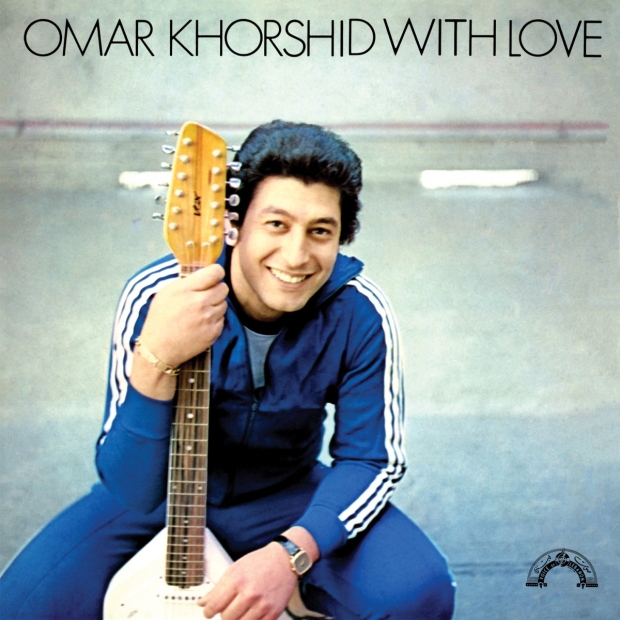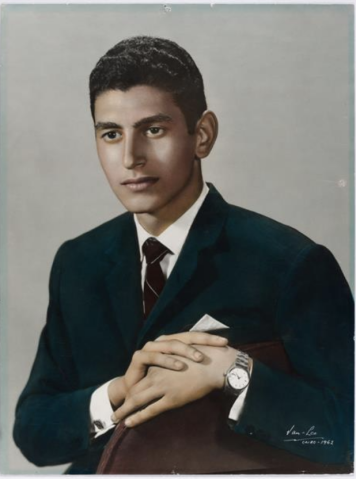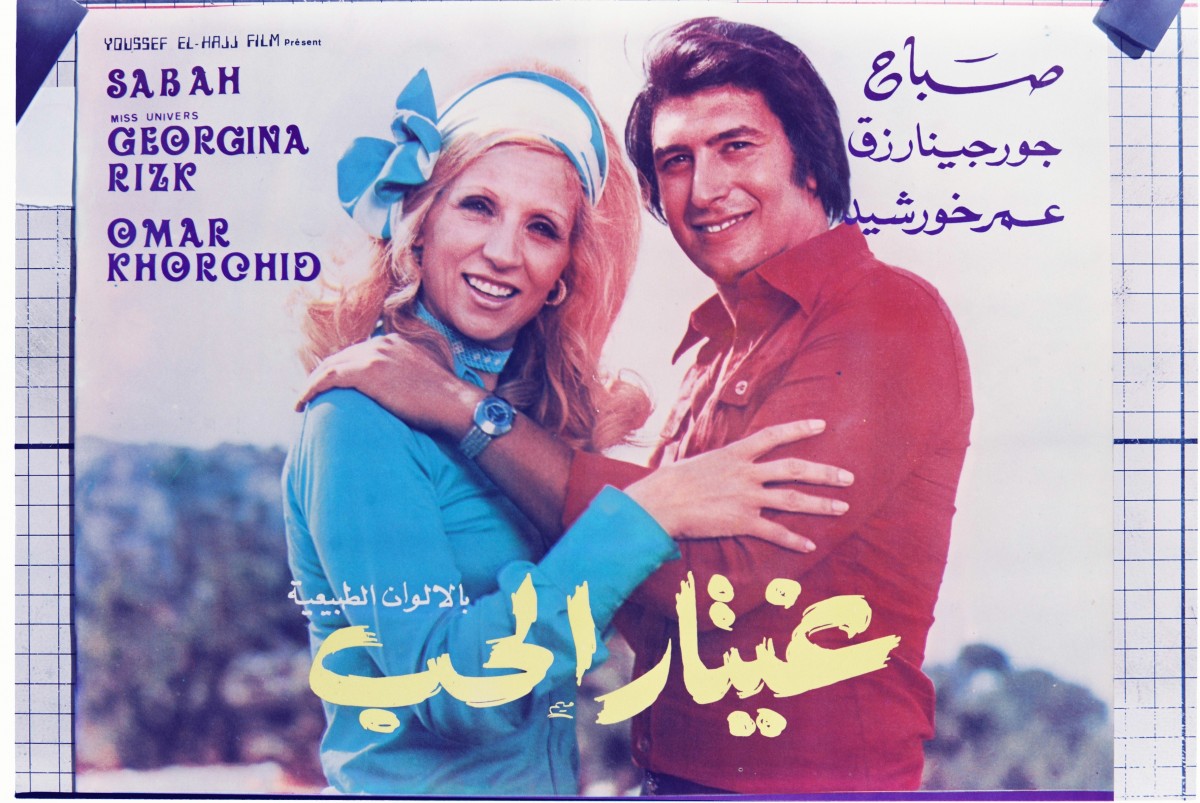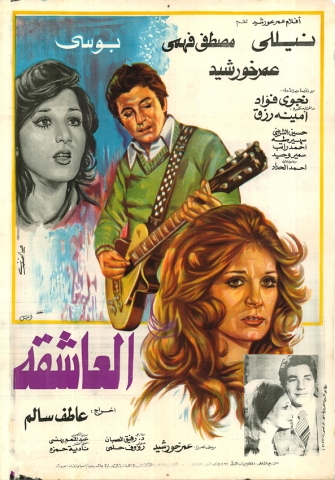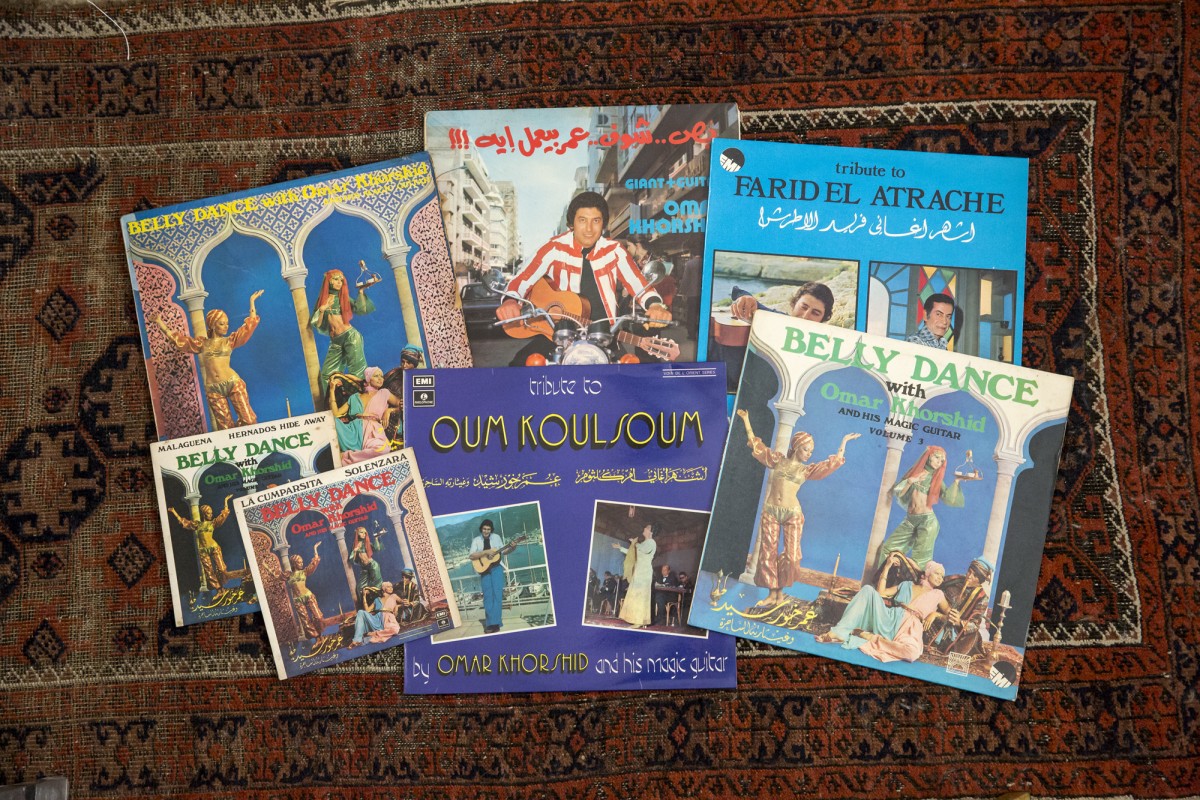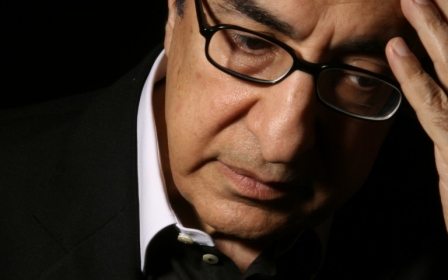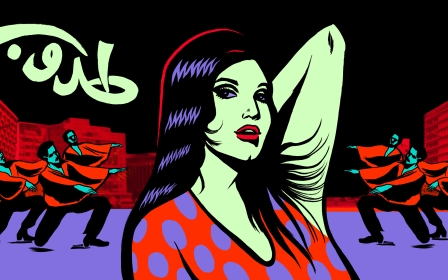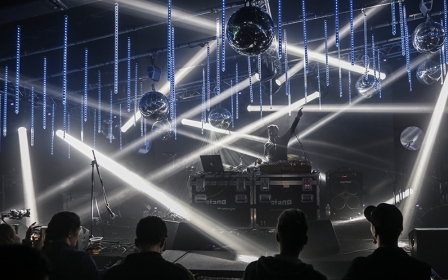Omar Khorshid: Celebrating the illustrious career of Egypt's guitar legend
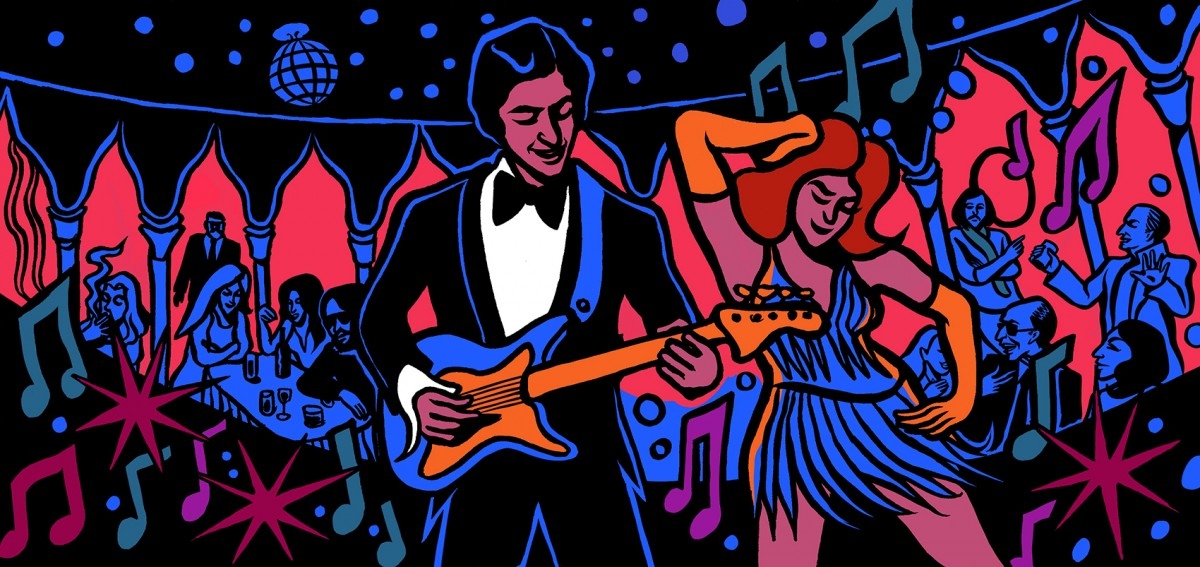
In a scene from Henry Barakat’s 1971 film Ebnati El Aziza (My Dear Daughter), the iconic Egyptian electric guitarist Omar Khorshid plays a slow building improvised solo in the kurd scale on his Fender Stratocaster. Dressed in a black dinner jacket and bow-tie with a slicked back hairstyle and charismatic smile, he stands alone on stage, his shadow extending out behind him onto a dreamlike set.
The camera switches to the enchanted audience watching his show. Legendary actor Rushdy Abaza and the singer Nagat al-Saghira are sitting in the front row. Then the camera zooms in on Khorshid’s distinctive fast-picking technique as he changes tempo and scale.
His performances, featured again and again in Egyptian films and TV series of the 1970s, are emblematic of the legendary status that Omar Khorshid had achieved by his mid-20s, through an innovative music career that brought a new sound to the Middle Eastern musical landscape.
King of the electric guitar in the Arab world and a Don Juan type figure known for his good looks, sharp mind and love of fast cars, Khorshid had become such a luminary figure that he played himself on the screen.
New MEE newsletter: Jerusalem Dispatch
Sign up to get the latest insights and analysis on Israel-Palestine, alongside Turkey Unpacked and other MEE newsletters
Before the age of 30, he had built a reputation as a talented guitar player, starting his career playing with 1960s Egyptian bands, covering songs by the Beatles and the Shadows, and going on to play in the ultimate oriental music orchestras of the period accompanying Oum Kalthoum, Abdel Halim Hafez and Farid al-Atrash.
In the 1970s, Khorshid composed many award-winning film soundtracks and TV themes and starred in over 20 films and TV and radio series. He also released around 10 solo albums of forward-thinking guitar music, the first of their kind in the region.
Then in May 1981, with his career at its peak, Khorshid died in a car accident, after reportedly driving at high speed along Cairo's famous El Haram street. The circumstances of his death are still the subject of much speculation. He was just 36-years-old.
Marking the 40th anniversary of Khorshid’s death, on 26 February 2021, UK-based record label We Want Sounds reissued the guitarist’s landmark 1978 record With Love on vinyl for the first time since its original release.
Recorded by Lebanese sound engineer Nabil Mumtaz in Beirut’s Polysound Studios, the 10-track album displays Khorshid’s unique and skilful electric guitar techniques through his psychedelic rearrangements of hits of the period.
The record opens with an experimental instrumental version of the romantic ballad Ahwak (I Love You), one of Egyptian singer Abdel Halim Hafez’s classic songs, written by the Egyptian composer Mohammed Abdel Wahab. It starts with an atmospheric down-tempo guitar solo with wah-wah and echo effect, with the synth giving the instrumental a psychedelic texture, before it crescendos.
Three compositions by Lebanese musician Elias Rahbani are also featured: his popular theme to the film Habibati (My Darling), as well as Ya Nasini (Oh You, Who 's Forgotten Me), an upbeat pop hit for the Lebanese singer Georgette Sayegh, and the romantic ballad Beyni Ou Beynak (Between You and Me), written for Fairouz’s sister, the singer Huda.
Farid al-Atrash’s 1974 colourful dabkeh-flavoured hit Hebbina Hebbina (Love Me, Love Me), from a soundtrack he wrote to the film Nagham Fi Hayati (Melody in my Life), is reimagined by Khorshid in an instrumental version, as well as al-Atrash’s song Banadi Aleyk (I'm Calling You).
The album is an exploration into Khorshid’s experimental ideas and creative vision, showing how he was pushing the boundaries of oriental music at the time. Forty years after his death, his imprint on Arabic music remains ever present and his musical legacy continues to spread beyond Egypt and the Middle East.
Khorshid’s formative years
Omar Khorshid was born in Cairo on 9 April 1945, during a period of transformation and political and social unrest. Tension at the presence of British troops was rising, with student and worker demonstrations breaking out across Cairo and Alexandria. He came from an artistic background; his father, Ahmed Khorshid, was a renowned director of photography (DOP) who worked with star directors in Egyptian cinema, including Youssef Chahine and Hussein Kamal.
Young Omar was nine-years old when he bought his first guitar, a purchase that met initially with strong objection from his mother.
“She thought this guitar was going to spoil me, and that there would be no school, no studying. She saw me playing the guitar all the time and not doing anything else, so she took the guitar and threw it from the balcony,” Khorshid told presenter and actor Samir Sabri in a 1970s interview on the Hatha El Masaa TV show.
With guitar instruction not yet offered at the Cairo Conservatoire, Khorshid instead trained at the Greek Institute for Philharmony, alongside his philosophy studies at the Human Sciences University.
His career as a guitarist began in the 1960s, performing with a number of Egyptian bands playing Western music in the restaurants and clubs of Cairo and Luxor. The most famous of these bands was Le Petit Chats, who Khorshid played with for around five years.
Influenced by the wave of Beatlemania spreading around the world, Le Petit Chats was formed by Wagdi Francis and Ezzat Abu Ouf in 1967, just a month after Egypt's defeat in the Arab-Israeli war, a time of national crisis and collective depression.
“We couldn’t believe what happened, and we wanted to escape. So, we escaped through the music,” Francis told presenter Essad Younis in an interview in 2016, the year of the band’s second comeback. Le Petit Chats built a cult following among Egypt’s hip young generation and even toured Lebanon and Syria.
Khorshid joined the band a few years after their formation, the same time as Hany Shenouda, a keyboardist and composer who wrote songs for renowned artists such as Nagat al-Saghira and Mohamed Mounir and went on to form Al Massrieen (The Egyptians), a progressive music group of the 1970s and 1980s.
In an interview over the phone from Cairo, Shenouda, now in his late 70s, reminisced about his time playing with Khorshid in Le Petit Chats. “Khorshid was the lead guitarist in Le Petit Chats when I replaced the pianist Ezzat Abu Ouf... We used to play covers, you name it - English songs, French, Spanish, Italian. We had a really international crowd.”
According to Shenouda, it was during his time playing with Le Petit Chats that Khorshid attracted the attention of Ahmed Fouad Hassan. A composer, musician and conductor, Hassan (1928-1993) founded one of the most famous orchestras in Egypt, Al Firka Al Masiya, in the early 1950s. They had a huge presence on the Arab music scene, backing up icons such as Abdel Halim Hafez, Warda, Faiza Ahmed and Mohammed Abdou.
‘Polluting the oriental ensemble’
Khorshid’s first live performance of oriental music with Al Firka Al Masiya was at Cairo's Qasr Al Nil Cinema in 1968 on Abdel Halim Hafez’s song Sawah (Wanderer), which was written by the pioneering Egyptian composer Baligh Hamdy (1931-1993). The electric guitar is hidden in the background, barely audible because, as Khorshid said in an interview, they were experimenting to see whether it would work.
While for Khorshid’s second performance on Zay El Hawa (It Feels Like Love), another Hamdy composition for Hafez, first performed at Cinema Rivoli in 1970, the electric guitar has a strong presence. The song kicks off with Khorshid’s solo to applause from the crowd. Watching the video, the excitement is palpable at the new sound of the electric guitar in the Oriental orchestra.
Soon, Khorshid was asked to join the orchestra of the all-time diva of Arabic music, Oum Kalthoum. His debut performance was on the song Marrit Al Ayyam (The Days Passed) in March 1970.
“I was terrified,” Khorshid said in an interview. “Before the concert, I went to the chemist and bought tranquillisers, but they didn’t do anything. The first solo I played in the song, after the curtains opened and I started to calm down, was a waltz. The audience started applauding for it and I got more nervous as I wasn’t expecting it. When the refrain came back and I had to do the solo again, I couldn’t because I was too nervous.”
Hamdy was one of the leading figures in this revolutionary moment in Arabic music, pushing to add instruments such as the electric guitar, keyboard and electric violin to the orchestra. The move created a controversial split between composers, musicians and music critics.
Renowned organist Hany Mehanna, who become a professional accordionist at 16, playing with the likes of Mahmoud Shokoko and Mohamed Abdel Mottaleb, was one of the musicians contributing to this new sound in the orchestras of Hafez and Oum Kalthoum. Friends with Khorshid before they worked together in Al Firka Al Masiya, the two formed a kind of duo.
“Me and Omar had a lot of resistance against us,” Mehanna tells MEE, over the phone from Cairo.
“Mahmoud El Sherif was one of the main people who was fighting us as well as lots of composers who were famous in the radios. They were all saying, 'You’re polluting the takht el sharqi (oriental music ensemble) with western instruments.'" Mehanna’s counter argument was that “except for the oud and qanun, most instruments of the orchestra are western, but they were adapted for use in oriental music.”
Both Mehanna - who says he was the first musician to play oriental music on a keyboard in Egypt - and Khorshid played an innovative role in adapting their instruments to play the quarter tones of oriental music. With Egyptian composer and musician Ammar El Sherie, Mehanna wrote to Yamaha explaining the musical dimensions between the quarter tone and halftone so the Japanese company could develop a keyboard able to play oriental music.
Similarly, Khorshid adapted his guitar: “Khorshid custom-made his guitar, splitting the fret into two to be able to play the quarter tone,” says Shenouda. “Khorshid had a certain style on the guitar that nobody could imitate. He was very successful at the time and he added a lot to Egyptian music.”
Khorshid’s guitar playing impressed President Jimmy Carter, himself an amateur guitarist
As this new wave became more dominant and established, Khorshid and Mehanna became among the most in-demand musicians of the period, playing in nightclubs with their own bands, touring the world and writing so many soundtracks for film and TV that they even established a deal to record for free on each other’s productions.
Part of the young generation of Egyptian musicians with a new and innovative sound, Khorshid and Mehanna were both asked by the country's president, Anwar Sadat, to join him to perform at the White House during the Camp David agreement with Israel in 1978. Mehanna couldn’t make it as he was already on tour with Lebanese singer and actress Sabah in Australia, but Khorshid’s guitar playing impressed US President Jimmy Carter, himself an amateur guitarist.
“Khorshid told me that Jimmy Carter came backstage after he played and wanted to know about his tapping technique,” says Shenouda. “Tapping wasn’t that common at the time and he would tap Egyptian rhythms on the chords like the maqsoum (a traditional Egyptian folk rhythm) - it was amazing.”
Exploring possibilities
In 1974, after around five years playing with Al Firka Al Masiya, Khorshid went on to form his own group, keen to explore the potential of the guitar.
“Even if we were playing our own style and character, I am limited by the melody that was written for us,” said Khorshid in 1979, two years before his death, in a joint interview with Mehanna.
“Of course, with the guitar as a western instrument newly introduced to oriental music, most composers who wrote for the guitar gave it the maximum they could imagine it could do. From my own study of the instrument, I wanted to show that the possibilities of the guitar go far beyond that.”
Mehanna was in Lebanon around the same time as Khorshid, with a residency at the Grand Hotel in Raouche, and recalls memories of their time together in Beirut. “My day off was on a Sunday so I used to go with the owner of the club to where Omar Khorshid was playing in Hamra. He used to open ten bottles of champagne and send them to Khorshid and said they were from Hany Mehanna. They were beautiful days.”
It was in Lebanon that Khorshid recorded a series of groundbreaking solo albums of experimental guitar instrumentals. His records varied from his own compositions to modern rearrangements of classical tarab, belly dance and Arabic pop, to 1960s and 1970s Latin-pop, flamenco and ballads, reinterpreted in an oriental style.
In 1974 alone, he released four albums: a trilogy of belly dance on Lebanese label Voix De L’Orient and his timeless classic on Voice of Lebanon Boss Shouf, Omar Byamel eh!!! (Look and See, What Omar’s Doing!!!), which features an iconic cover showing Omar on a motorbike on Beirut’s famous Hamra Street. He also released tribute albums for Oum Kalthoum and Farid al-Atrash, as well as the albums Bellydance from Lebanon and With Love, Vol 1 and 2, in the late 70s.
Whether he was aware of it or not, Khorshid’s forward-thinking compositions on the electric guitar emphasise the oriental roots of surf music, pioneered by Lebanese-American guitarist Dick Dale, who took inspiration from his Lebanese heritage and the rhythm of the darbukah.
Though Khorshid died young, he achieved so much in his short life. His canon of work helped push the boundaries of his instrument, arguably making him one of the world’s most innovative guitarists. He opened the ground for guitarists wanting to play oriental music and inspired generations of guitarists around the world. For that, he will be remembered.
'With Love LP,' by Omar Khorshid, is available from We Want Sounds
Middle East Eye delivers independent and unrivalled coverage and analysis of the Middle East, North Africa and beyond. To learn more about republishing this content and the associated fees, please fill out this form. More about MEE can be found here.


